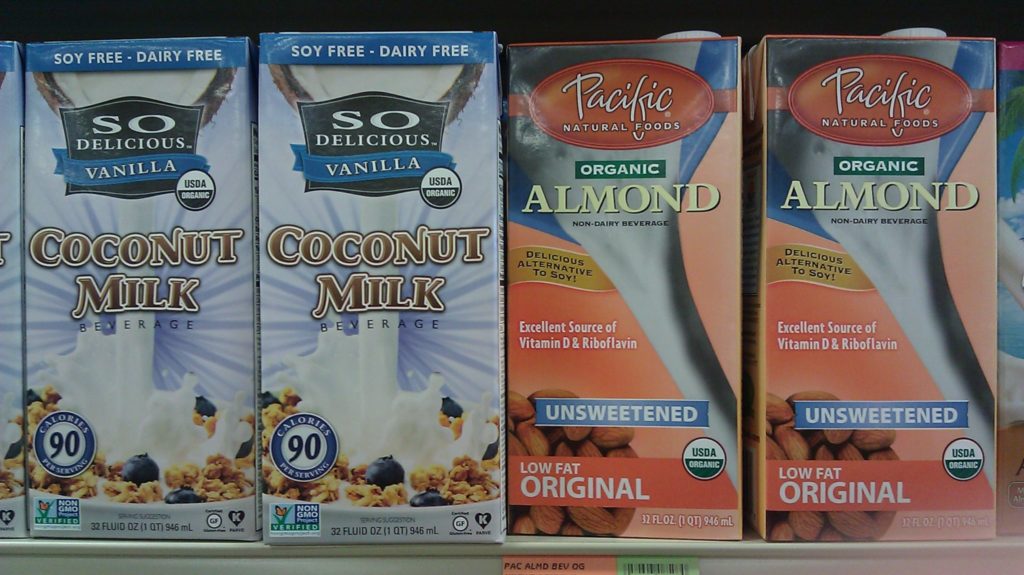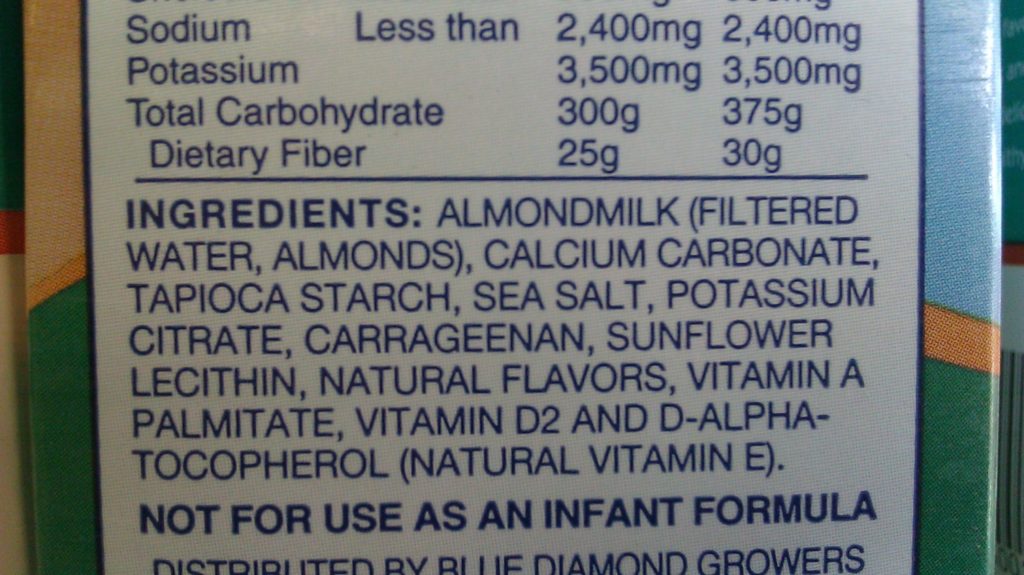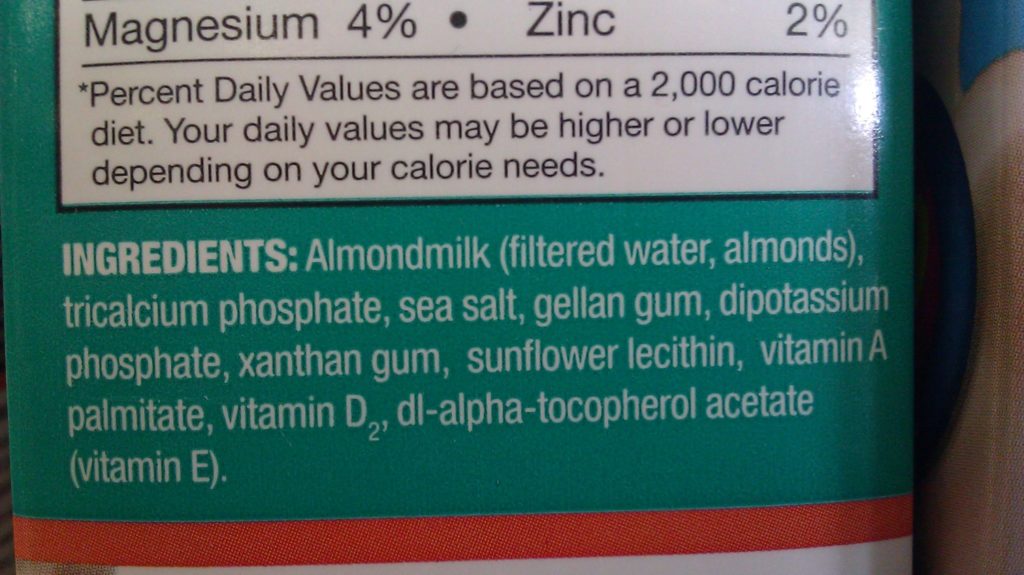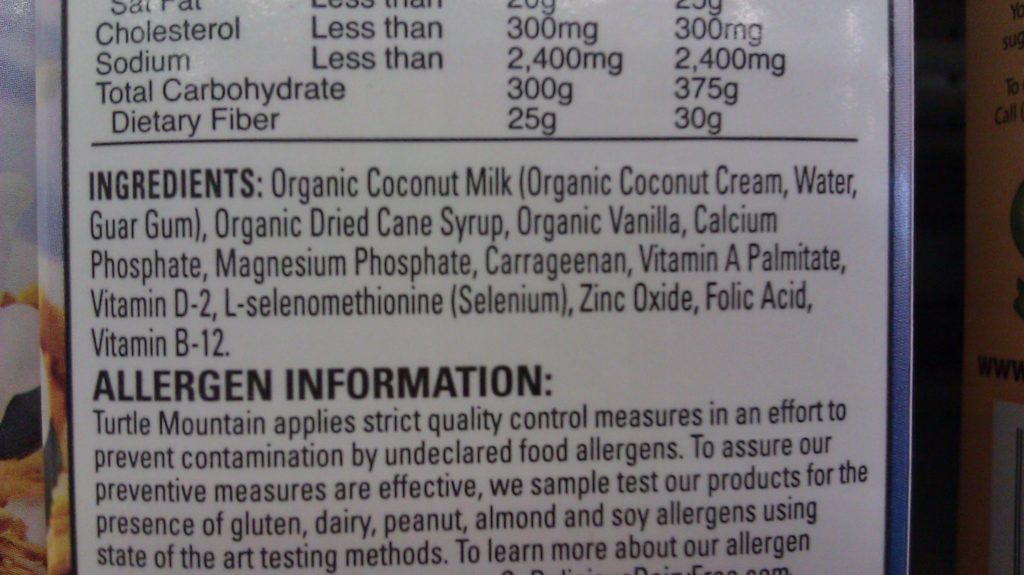 Organic coconut milk and almond milk are common purchases at the health food store by those with dairy allergies. Usually, these people are savvy consumers who know enough nutritionally to avoid soy milk with its endocrine disrupting isoflavones and gastric inflaming phytates. Rice milk is also steadily declining in popularity as it is really not much more than a glass of sugar water nutritionally speaking.
Organic coconut milk and almond milk are common purchases at the health food store by those with dairy allergies. Usually, these people are savvy consumers who know enough nutritionally to avoid soy milk with its endocrine disrupting isoflavones and gastric inflaming phytates. Rice milk is also steadily declining in popularity as it is really not much more than a glass of sugar water nutritionally speaking.
Organic, unsweetened coconut milk and almond milk in cartons seem like great alternatives at first blush, but are they really as “healthy” as people believe?
Let’s take a look at the labels. I was shocked at what I found.
Check out the labels of the three brands I photographed. I checked all the brands, by the way, and they all contained the same dangerous additives I’m about to describe.

First, Vitamin A Palmitate is added, the synthetic version of Vitamin A. I personally avoid synthetic versions of Vitamin A like the plague. Every single multi-vitamin I’ve ever examined contains some form of synthetic A, including the so called “whole foods” multis.
Synthetic vitamins are the chemical mirror images of the real, natural versions. They can cause imbalances over time. Even small amounts of the synthetic fat soluble vitamins like Vitamin A can prove toxic and should be strictly avoided!
The Organic Consumers Association warns that isolated vitamins such as those produced synthetically cannot be recognized or metabolized by the body in the same way as the natural version.

Large doses of natural vitamin A are well tolerated by the body as established by researchers decades ago, however. Traditional diets contain 10 times or more of the RDA of this nutrient with no ill effect. However, synthetic vitamin A is associated with birth defects and bone fractures. It has no benefit in the diet whatsoever.

The second really bad additive in these organic cartons of coconut milk and almond milk is Vitamin D2. Vitamin D2 is a form of the wonder vitamin that you should take great pains to avoid.
In all known cases of Vitamin D toxicity where the dose was intentional, Vitamin D2 was the culprit. By comparison, Vitamin D3 is much less toxic and requires an enormous or even an accidental dose to produce any toxic effect.
Vitamin D2 is manufactured industrially by irradiating yeast. It is dangerous for D2 to be added to any food product particularly if this product would be given to children, where toxicity symptoms would appear at much lower dosages.
None of the store brands of cartoned coconut milk or almond milk were free of these dangerous and synthetic versions of the fat soluble vitamins!
Notice also that carrageenan is present in 2 of the 3 products as well! Dr. Andrew Weil has been telling people to avoid carrageenan since 2002.
Carrageenan is so toxic and inflaming to the human digestive system that this food additive is formally classified by the International Agency for Research on Cancer (part of the World Health Organization) as a potential human carcinogen.
In my view, it would be a mistake to purchase and consume these items. They are in no way health promoting or beneficial, particularly for growing children!
Healthy Alternatives to Coconut Milk and Almond Milk in Cartons
Coconut milk and almond milk should be healthy and they can be if they are produced at home without these dangerous additives. I wrote an in depth post on how to easily make these nondairy beverages yourself. This recipe for wild rice milk is a good option as well.
Believe it or not, even organic coconut milk in BPA free cans would be a better alternative to cartons of coconut milk based on my label inspection!
Check out my video on homemade coconut milk and my article on how to make healthy DIY almond milk, fermented to add probiotics and enzymes to boost immunity and improve digestion.
Sarah, The Healthy Home Economist
Sources
From Seafood to Sunshine: A New Understanding of Vitamin D Safety








Thank you for this information. I buy this exact almond milk once or twice a year to use when we go out of town. I have always cringed when I read the ingredients but have turned a blind eye for the 1 or 2 cupfuls my kids consume. Hard to do that now with this information. I need to just make my own. It’s so easy, but I get lazy when I make everything else from scratch and need a break sometime.
I totally understand the “need a break” thing. You wonder why they add that stuff to begin with. It would be just fine without it. But, then you realize that they add it to market to the vegan community and then the whole reasons for maximizing profits and appealing to the widest variety of consumer becomes apparent.
Sarah, they do not add it to appeal to the vegan market. Where did you get that idea? If certain vitamins that have an established RDA are present in your food product, including A and I believe D, then you are require to “claim” it in the nutrition facts box. As you can imagine, the vitamin and mineral amounts of completely unprocessed food varies, however you must meet the label claim everytime. This is why vitamins are added. Because its required to be listed if t’s present in a greater than zero amount, and it’s required to be accurate. Companies can’t pay to test each box of milk separately to ensure the nutrition facts are accurate, so the ensure that the vitamins are present in even amounts by adding them in specific amounts.
thehealthyhomeeconomist I also wonder what you would take instead of prenatals and vitamins. I have a women’s rainbow multi.??
Just wondering if my raw milk isn’t the best ultimately. Unless of course you are totally allergic to milk.
Wow, crazy!!
Coconut and Almond Milk in Cartons Not a Healthy Buy http://t.co/VcQ9rdUY
Coconut and Almond Milk in Cartons Not a Healthy Buy – The Healthy Home Economist http://t.co/POzuGKtR
No kidding!
I have plain coconut milk (same brand as you depict) and it does not have VitA palminate. Whew.
The label of the brand above that I show a picture of does have vitamin A palmitate in it (see ingredients label that I took a photograph of just below it). ALso, check for D2.
what is the brand?
bpa free
So what brands of cartoned coconut milk are the ones that we can drink?
and what brands of coconut milk in a can are bpa?
Click the links I provided at the end of the post to see the (very few) decent brands plus a picture of what they look like.
the only one i can find in your links is lait de noix de coco coconut milk and its not organic:( if im missing something can you post themaes of the good brand more clearly for people not many of us have time to go over link to link to link and search it down no offence thank you